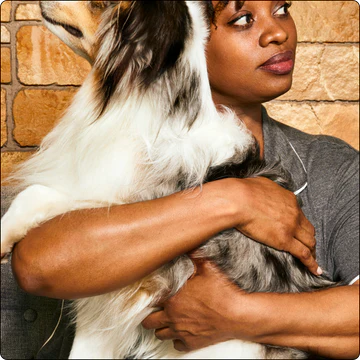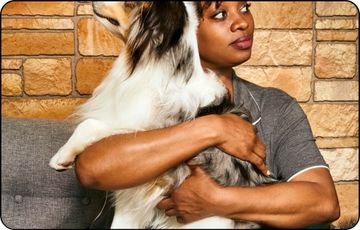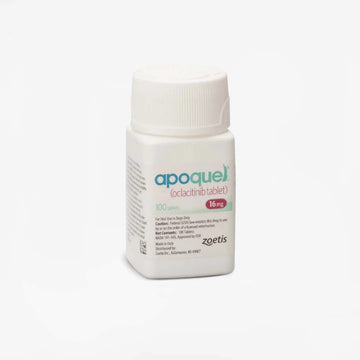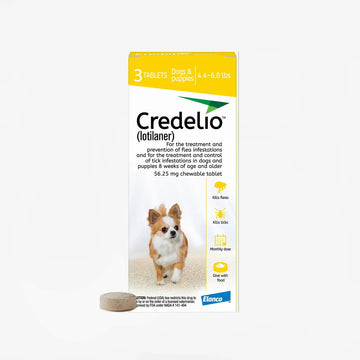Get itch relief for your dog from home with online vet care
Skip the trip and see one of our online vets to get your prescription. Plans start at $11/mo.

- Unlimited vet visits and follow-ups
- Prescriptions delivered free to you
- 100% licensed veterinarians

Why Dutch

Always there for you
Get care and peace of mind quickly anytime — even nights and weekends.

Easier on you & your pet
Talk to a vet from home. No stress, hassle, or long wait.

High-quality care, low price
Save over $650 a year on vet care and prescriptions vs. typical vets.
Benefits that save you time, money & stress
Unlimited care for
one low cost
Lower your vet care costs with unlimited vet calls for less than the cost of one vet trip.
Easier on you &
your pet
Get care with a 10-minute call from the comfort of home. No stress, wasted time, or hassle.
24/7
peace of mind
Skip unnecessary ER trips with same-day care whenever and wherever you need it.
Covers the whole fur family
Annual plans include up to 5 pets — saving you even more time and money.
Benefits that save you time, money & stress

Why is my dog itching?
Learn what causes itchy skin in dogs and what to do about it.


Fleas
Fleas
Fleas, mites, and ticks are common culprits when it comes to your dog’s itchiness. These blood-sucking bugs can stealthily latch onto your beloved pet and quickly reproduce. Some dogs and cats have hypersensitivity to flea saliva, thus flea bites can lead to your pet itching intensely.
Allergies
Allergies
Like humans, dogs are also vulnerable to allergies. Dogs may suffer allergic reactions to specific foods and environmental allergens. This can result in discomfort and itchiness, among other problems.
Mange
Mange
Mange is a common skin disease in dogs caused by mites that burrow into their skin or live in the hair follicles. The condition can cause extreme itchiness, hair loss, redness, and a thickening of the skin. If left untreated, mange is an infection that can quickly spread.
Anxiety
Anxiety
In some cases, your dog’s itching may be a result of a behavioral problem. A dog that’s constantly itching and scratching and biting at their skin due to anxiety can create more serious skin problems in the long term.
Medicine & Treatments For Dog Itching
Medicine & Treatments For Dog Itching
If your dog’s skin affliction is severe or home remedies don’t prove effective, it may be time to schedule a visit with one of our online vets. A Dutch-affiliated vet can consult with you online and design a personalized treatment plan based around your pet’s needs. And prescriptions are shipped free directly to your doorstep.
How Dutch works
-
Pick a plan and become a member
-
Schedule a video call with a licensed vet
-
Order the prescriptions the vet recommends
Frequently asked questions
What can I use Dutch for?
What can I use Dutch for?
With Dutch, you’re never alone when it comes to your pet’s health. Whether your pet needs care or you just have a question, our compassionate and knowledgeable vets are always happy to help.
Here are some ways you can use Dutch:
- Care & prescriptions for over 150 issues
- Behavioral health, nutrition, and exercise advice
- Puppy, kitten, and new pet parent advice
- Preventive care plans
- Night and weekend vet care
- Second opinions & follow-up care after in-person visits
- Advice on whether you need to go to the ER or urgent care
- Vet care when you’re traveling
- Easy prescription refills
- Longevity treatment plans
- Answers to non-urgent questions
What is a visit with Dutch like?
What is a visit with Dutch like?
When booking a video call with a vet, you'll be asked a few questions about your pet’s health issue. Depending on the issue, you may also be asked to fill out a longer questionnaire about their symptoms and share photographs of them so our veterinarians can better understand what’s going on. You’ll then pick an appointment time that works best for you.
During your video call, one of our licensed veterinarians will talk to you about the symptoms your pet is experiencing, ask you questions, review your pet’s medical history if you’ve provided it, and answer any questions you have. The vet will ask to see your pet and their environment. And they may ask you to perform some simple checks on them if needed.
After your video call, the vet will send you a message with a custom treatment plan to help your pet feel better, including a link to buy any recommended prescription or over-the-counter medications. Place your order and we’ll ship it free.
How do I know if you can treat my pet?
How do I know if you can treat my pet?
Our vets can provide care and prescriptions for more than 150 issues — and over 90% of cases can be treated virtually.
The vet can diagnose your pet based on your description of their symptoms, their medical history, seeing them during your video call, and, if needed, through uploaded photos and videos. They may ask you to do a few simple checks during the call. We also offer a number of at-home lab test kits for dogs and cats.
The health and safety of pets is our top priority. In the rare case that a vet determines a pet needs to go to a local clinic, they’ll provide a referral and offer advice on how to care for them until they can be seen.
Some things that require in-person care include emergencies, wounds that need stitches, and issues that require blood work, imaging (X-rays or ultrasounds), or surgery.
Our vets are always available for second opinions and follow-up care after in-person vet visits — so you don’t have to navigate health issues alone.
How much will it cost for Dutch to treat my pet?
How much will it cost for Dutch to treat my pet?
Our memberships are designed to make your pet’s care as easy and affordable as possible. Here’s how your costs will break down:
Membership: You can choose to pay the total price upfront or in 4 installments. All memberships include unlimited care for up to 5 pets at no extra cost.
Vet calls and messaging: No cost — video chat and message with vets as often as you need for free.
Medication: The price will vary depending on your pet’s needs. To keep your costs down, we offer a price-match guarantee, free standard shipping, $25 off your first product order, and 20% off your first flea & tick order.







